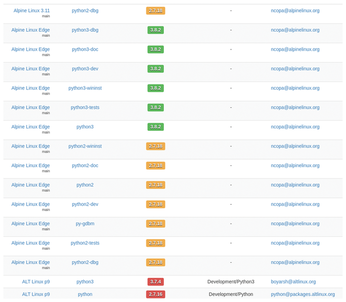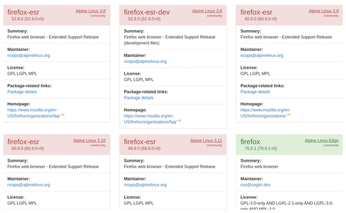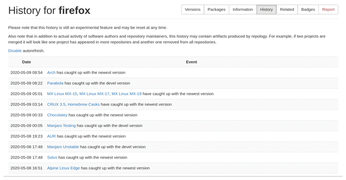A package search engine for Linux repositories
Green Is the Color
In order to be able to assess whether information is up to date, you need to pay attention to the color codes. A chart explaining what each color means can be found at the bottom of each page or in the documentation [3]. If you are always looking for the latest versions, you want to watch out for the color green.
In Figure 1, Firefox 76.0.1 is green, but Firefox 76.0, which was released only four days earlier at the time of writing, is highlighted in red and therefore considered deprecated. The newest version is beta version 77.0b3, shown in turquoise.
Sometimes an outdated version will not appear in red. Instead, it will have a yellow legacy label, which means that this version is still available for compatibility reasons (Figure 3).

Deeper and Deeper
In addition to the versions currently available through the distributions, you can also select Packages, Information, History, CVEs, Related, Badges, and Report in the buttonbar at the top. Each provides a different view of the information for a given package.
Clicking on Packages opens up a wealth of additional information on the various Firefox packages per version and distribution, allowing comparisons between the packages of different distributions (Figure 4).

If there is an official maintainer for a package, clicking on their email address reveals the other distributions for which they maintain this package. Package related links takes you to more information, such as the GitHub site, package information on dependencies and licenses, or which maintainer signed the package.
Unlike the Versions and Packages buttons, which focus on the package, Information lists data from all packages and groups it by type (e.g., versions of all known packages, summaries of all known packages, or links for all known packages).
Who's Been Busy?
The still experimental History button chronologically lists all actions related to Firefox (Figure 5). This view, like some others, can be set to Enable autorefresh, which causes the page to automatically refresh the content.

Related lists connections from Firefox to other projects. The tool identifies related projects by recursively matching URLs on the package homepage.
Badges includes code snippets used to create badges that summon up information from Repology to be included on other websites as a badge. Badges come in different formats, determined by the code snippets.
Report lets you report problems in regards to how a project is displayed. Errors include the wrong latest version number, an unrelated entry that needs to be split into a new project, or entries for the same project with different names that need to be merged into a single project. Errors are virtually unavoidable with the abundance of cross-referenced information.
« Previous 1 2 3 4 Next »
Buy this article as PDF
(incl. VAT)
